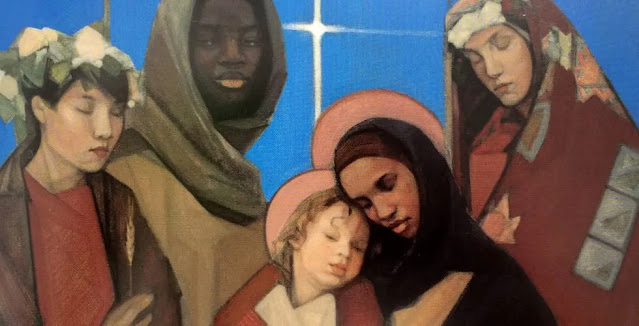Monday, January 22, 2024
it was 60 years ago today (well, almost...)
Tuesday, January 16, 2024
the snow has arrived...
Love doesn’t want what it doesn’t have. Love doesn’t strut,
Doesn’t have a swelled head, doesn’t force itself on others,
Isn’t always “me first,” doesn’t fly off the handle,
Doesn’t keep score of the sins of others, doesn’t revel when others grovel, takes pleasure in the flowering of truth, puts up with anything, Trusts God always, always looks for the best, never looks back, and keeps going to the end. Love never dies. Inspired speech will be over some day; praying in tongues will end; understanding will reach its limit. We know only a portion of the truth, and what we say about God is always incomplete. But when the Complete arrives, our incompletes will be canceled.
Monday, January 15, 2024
why the inward journey is essential for social justice...
Friday, January 12, 2024
a humble look at a new way of serving God's church...
Monday, January 1, 2024
postponing small is holy until epiphany 2024...
Two poems by Madelene L’Engle have been close to my heart this season: The Risk of Birth, Christmas 1973 and First Coming. Both gently insist that sentimentalizing the Christmas story is both historically and spiritually wrong. If we’re to find eyes to truly see, we must practice a sacramental metaphysics, one that knows how to wait and search the most unlikely places for presence of the Christ-child. That’s why this year we’ve seen so many nativity icons set in the rubble of the war between Israel and Gaza: NOT because Jesus was a Palestinian (that’s an ideological simplicity of the most damaging type; yes, modern day Bethlehem does lay within the confines of West Bank, but to call Jesus (or the Holy Family) Palestinians is anachronistic and dishonest). Rather, this war – and all the others – reminds us that the holy continues to break into history whether we choose to see it or not.
This is no time for a child to be born,
With the earth betrayed by war & hate
And a comet slashing the sky to warn
That time runs out & the sun burns late.
That was no time for a child to be born,
In a land in the crushing grip of Rome;
Honor & truth were trampled by scorn–
Yet here did the Savior make his home.
When is the time for love to be born?
The inn is full on the planet earth,
And by a comet the sky is torn–
Yet Love still takes the risk of birth.
“I must make two honest confessions to you, my Christian and Jewish brothers. First, I must confess that over the past few years I have been gravely disappointed with the white moderate. I have almost reached the regrettable conclusion that the Negro's great stumbling block in his stride toward freedom is not the White Citizen's Counciler or the Ku Klux Klanner, but the white moderate, who is more devoted to "order" than to justice; who prefers a negative peace which is the absence of tension to a positive peace which is the presence of justice; who constantly says: "I agree with you in the goal you seek, but I cannot agree with your methods of direct action"; who paternalistically believes he can set the timetable for another man's freedom; who lives by a mythical concept of time and who constantly advises the Negro to wait for a "more convenient season." Shallow understanding from people of good will is more frustrating than absolute misunderstanding from people of ill will. Lukewarm acceptance is much more bewildering than outright rejection.”
Carrie Newcomer channels MLK and Rabbi Hillel when she sings, “If not now, tell me when.: Ms. L’Engle does likewise as she reframes the Christmas story in it’s authentic context.
He did not wait till the world was ready,
till men and nations were at peace
He came when the Heavens were unsteady
and prisoners cried out for release.
He did not wait for the perfect time.
He came when the need was deep and great.
He dined with sinners in all their grime,
turned water into wine. He did not wait
till hearts were pure. In joy he came
to a tarnished world of sin and doubt.
To a world like ours, of anguished shame
He came, and his Light would not go out.
He came to a world which did not mesh,
to heal its tangles, shield its scorn.
In the mystery of the Word made Flesh
the Maker of the stars was born.
We cannot wait till the world is sane
to raise our songs with joyful voice,
for to share our grief, to touch our pain,
He came with Love: Rejoice! Rejoice! So, no music for me this week – except personal practice – and we’ll pause “Small is Holy” until NEXT Sunday and the Feast of Epiphany. Be well, beloved. Be grounded. Be safe. And rejoice in the Lord always.













.webp)


